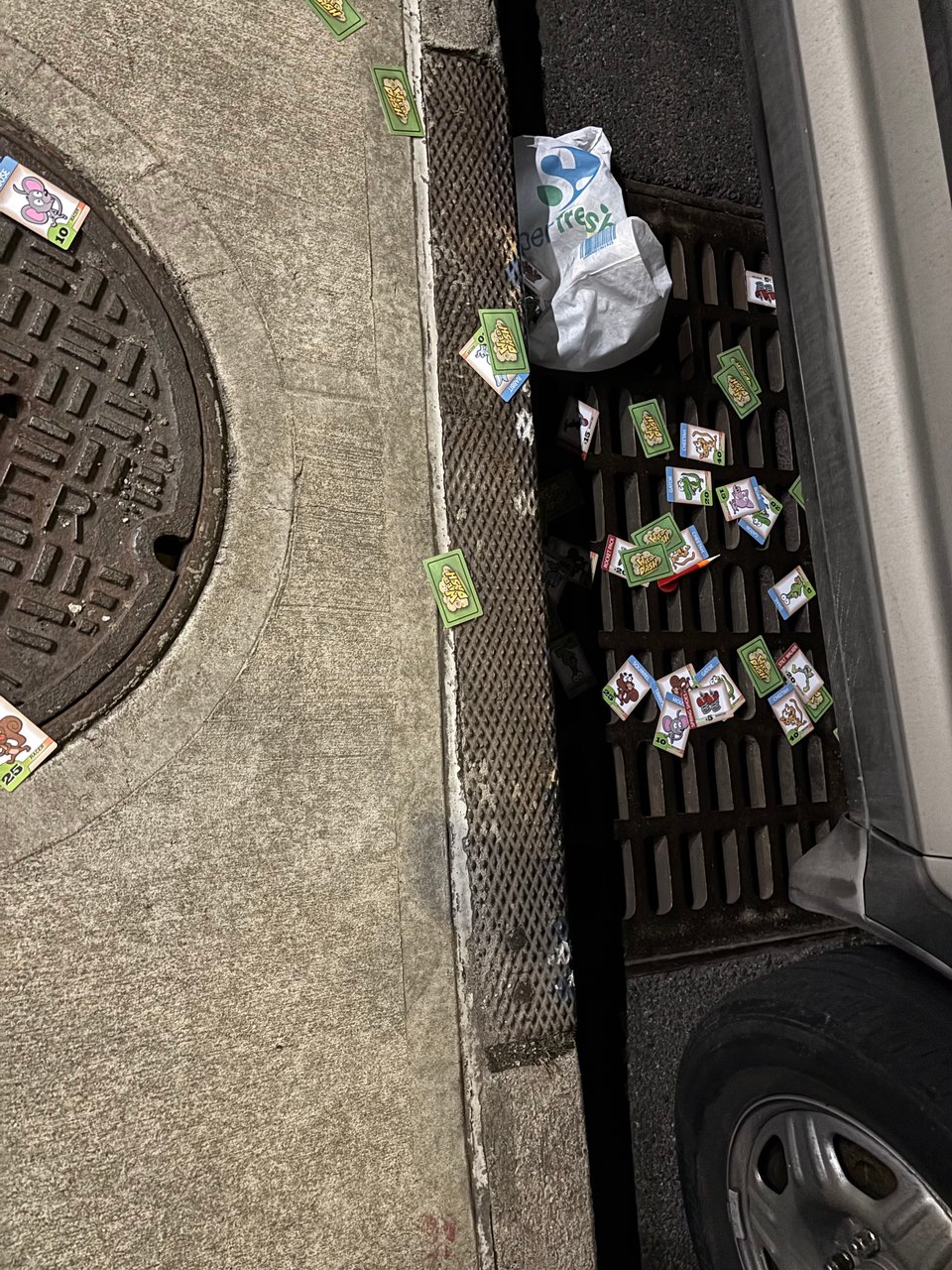Curation is strangling community and we should all play poker about it

Scattered playing cards
Die-cut card stock (presumed)
2.5 x 3.5 in
62 pc
Found outside rosemary’s playground, Ridgewood, NY
This week I present a stack of playing cards with animal illustrations and numbers in large print; a children’s game. Refreshingly, one that doesn’t involve a screen. As a childless 20 something year old, I giggled, imagining a toddler slamming down their juicebox on the playground asphalt, sweeping a round of Texas hold em.
“And that’s a royal flush. Tony, your fruit snacks are mine.”
But I guess it makes sense. Teaches them numbers, strategy, all without a screen.
I felt a sense of satisfaction in knowing somewhere out there some kid is getting their enrichment outside the digital sphere. And Mom and Dad clearly had their hands quite full managing their entertainment, such that all but two cards of their precious deck ended up scattered on the pavement. That, along with the puzzle, the pieces of darts; all games with a billion little pieces, for their chubby hands to develop their fine motor skills. And they’re all collective games, to be played around a table of other chubby handed kids. A birthday party perhaps? Or a lot of siblings. Good for them, either way.

During/post COVID, a bunch of pieces came out suggesting children’s mental health and loneliness were going downhill, that Gen Alpha isn’t getting the social skills they need outside of Roblox. One Gallup poll said 45% of parents were worried about their kids’ social skills declining, 22% say their worries are ongoing, as of this march. They probably have good reason for worry. The average McDonald’s play place is now pretty much just a sad little tube, and they’re becoming less and less prevalent in new establishments. It’s no longer common here in New York to chill out on a stoop unsupervised. A 2021 study showed unsupervised outdoor play was declining dramatically; the tradition of children bonding through collective outdoor games is another avenue of social skills building that’s growing into a dead end. There appears to be less and less of a place in the world for kids to hang out with other kids and bond with one another in their mutual kid-ness.
Children’s activities are largely managed by adults. There’s recess, after school sports, choir, the school play. We still have Sunday school, Hebrew school, and parents on Facebook organizing playgroups.
But all of those things require a presupposed “in.”. You have to pay for most sports, belong to a certain community, religious or otherwise, or be enrolled in a certain school district. They’re also pre-curated based on common interests, in the case of sports, choir, the plays. Which sets them apart from the McDonald’s play place and outdoor games on the block, where you have the possibility of coming across anyone from any local school, regardless of peer group, common interests, or religious community.
That’s where the cards come in. It’s an activity not restricted by tax bracket. A deck of cards is sold everywhere an average retail price of three to six bucks, and most people have one at home. Nor is it restricted by interest, career, hobby, etc. While there is definitely a specific community of poker fanatics, card games are something everybody usually knows at least one or two of. Few activities are diffused throughout society like this; where most people can participate casually with the knowledge already in the back of their mind. In that sense, it’s an organic way of community building, as opposed to other ridiculous things we do to make friends as an adult. Conventions, dating apps, meetups for our niche hobbies.
To be fair, specific events for meeting like minded individuals work for some people. Kudos to those of us who can just do that; enter a space of strangers, walk up to various someones, maintain an effortless flow of conversation with the central goal of friend-making. That’s not everyone. Friend-making now often presents itself as the activity in itself, as opposed to happening naturally. That’s a lot of pressure.
Poker is a Hail Mary for the introverted. Not only does it unite a random group of people around the table, but the central goal is to win the round, not to make friends. Light conversation happens on its own. There’s opportunities to dig in, and an excuse to pull back, for focus. And no eye contact required either, you can always look down at ur hand.
A society against loneliness has such avenues for passive bonding. It has a structure that allows for friend-making by accident. Children still have this to a degree. They have their school plays, their forced proximity to other kids. The issue is that assisted friend-making activities like this have an expiration date. They’re not the ones without the tools, not yet at least.
If we want our shy kids to be able to resist loneliness, telling them to walk in with confidence and shmooze until they’ve made a friend is the wrong approach. We should instead teach them at least one version of poker. And gin rummy. War, at the very least.
This to say, the culture of loneliness is an object of our creation, and it didn’t start in the pandemic. It’s in part a reflection of the grownup failure to hold onto spaces for organic community building, rather than organized or curated by our niche interests or certain points of identity. Passive friend-making activities are what we need if we intend to cultivate a world where community building isn’t a struggle. It just happens. Around a poker table, for starters.

Reading List
📚 McDonald’s Customers Lament ‘Depressing’ PlayPlace: ‘This Is Worse Than Nothing,’ Parade
📚 Pandemic Hurt Children's Social Skills, Mental Health Most, Gallup
📚 Bowling Alone: The Collapse and Revival of American Community, Robert Putnam
📚 The Great Good Place, Ray Oldenburg